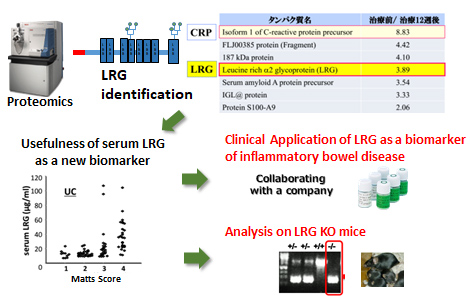Research Introduction
2. Proteomics Analysis of Sera from Arthritis Patients Led to Identification of a New Inflammatory Biomarker, LRG
 By proteomics study on sera from patients with rheumatoid arthritis, we obtained a list of inflammation-related serum proteins including CRP and Leucine-rich alpha-2-glycoprotein (LRG; Serada et al., Ann Rheum Dis, 2010). We then found that, unlike CRP, LRG is induced by many inflammatory cytokines including IL-6, TNF-α and IL-1β and its expression is upregulated not only in liver but in inflamed tissues. These findings explain why LRG is better than CRP in evaluating disease activity of inflammatory bowel disease (Serada et al., Inflamm Bowel Dis, 2012, Shinzaki et al., J Crohns Colitis, 2017), psoriasis (Nakajima et al., J Dermatol Sci. 2017) and rheumatoid arthritis (Fujimoto et al., Arthritis Rheumatol, 2015). Notably, LRG plays a role in pathogenesis of inflammation and tissue repair as shown by our analysis of LRG knockout mice with experimental arthritis (Urushima et al., Arthritis Res Ther, 2017) and lung fibrosis (Honda et al., Physiol Rep, 2017).
By proteomics study on sera from patients with rheumatoid arthritis, we obtained a list of inflammation-related serum proteins including CRP and Leucine-rich alpha-2-glycoprotein (LRG; Serada et al., Ann Rheum Dis, 2010). We then found that, unlike CRP, LRG is induced by many inflammatory cytokines including IL-6, TNF-α and IL-1β and its expression is upregulated not only in liver but in inflamed tissues. These findings explain why LRG is better than CRP in evaluating disease activity of inflammatory bowel disease (Serada et al., Inflamm Bowel Dis, 2012, Shinzaki et al., J Crohns Colitis, 2017), psoriasis (Nakajima et al., J Dermatol Sci. 2017) and rheumatoid arthritis (Fujimoto et al., Arthritis Rheumatol, 2015). Notably, LRG plays a role in pathogenesis of inflammation and tissue repair as shown by our analysis of LRG knockout mice with experimental arthritis (Urushima et al., Arthritis Res Ther, 2017) and lung fibrosis (Honda et al., Physiol Rep, 2017).






